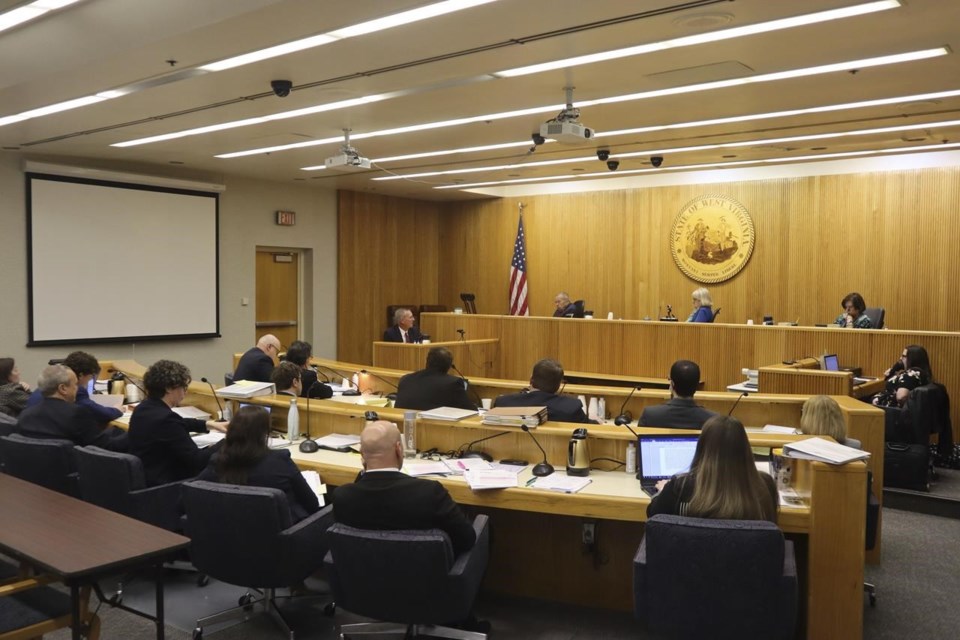CHARLESTON, W.Va. (AP) — More than 500,000 homes and businesses in West Virginia would see their electricity bills increase for up to a year or more to extend the life of a coal-fired power plant on the brink of closure under a proposal advancing through the state's utility regulatory agency.
West Virginia's Public Service Commission said this week it will allow Monongahela Power and Potomac Edison to move forward with finalizing a plan they project would cost 547,000 West Virginia ratepayers at least $36 million to cover the cost of keeping the two-unit, 1,300-megawatt Pleasants Power Station on the Ohio River open until May 2024.
The request, made at the urging of state Republican leadership, will allow the First Energy Corp. subsidiaries — which currently own two other coal-fired plants in West Virginia — to study the possibility of adding it to their power production holdings.
Otherwise, Pleasants Power Station’s more than 150 employees will lose their jobs after its current May 31 closure date, and the plant will likely be demolished by its owner, Texas-based Energy Transition and Environmental Management.
No surcharges can be implemented until the Public Service Commission approves a formal letter of intent, commissioners ruled Monday. But it allowed the companies to begin finalizing the agreement with ETEM and other stakeholders for commissioners' review.
The proposal comes as the federal government implements rules to limit the burning of polluting fossil fuels to combat the effects of climate change, causing coal-fired plants to shutter across the country.
Supporters of the plan have cited Pleasants' importance as an economic driver in the regional economy, generating millions in tax revenue for county schools and operations and employing not only plant workers but also providing jobs for hundreds of others in related fields, like coal mining.
But the plan has faced ardent opposition from consumer advocates and environmental groups, which have described it as “brash” and an “unjustifiable risk."
The companies project that home and business customers would likely see their monthly bills increase 2.2% — an average of $2.67 a month for residential customers, and $8.44 for commercial customers.
Those charges would be in addition to the cost of electricity, which increased around $5 a month this year for residental customers in West Virginia after the PSC approved the companies' request for a more than $90 million surcharge, citing rising coal costs. Pleasants would likely not produce power for the companies' customers or anyone else while the companies assess purchasing it. Employees would stay on for plant maintenance.
During a public hearing last week, lifelong West Virginian and Monongahela Power ratepayer Sally Roberts Wilson said most state residents like her are elderly, disabled, live on fixed incomes and can’t “bear the burden” of higher bills.
“It will become a choice of food or freezing or having a heat stroke in the summer months,” she said. “Too many of us live on the edges of these conditions in order to try to make ends meet.”
Originally slated for closure in 2018, Pleasants has received millions in bailouts from state Republican leaders that have extended its life for years.
In 2019, Gov. Jim Justice approved $12.5 million in tax breaks to bolster the plant, delaying its closure. And Justice — whose family owned coal mines — signed a law last month that requires the state to sign off on any plan to decommission or deconstruct an existing power plant, seemingly with Pleasants in mind.
This year, both chambers of the West Virginia Legislature passed resolutions encouraging Monongahela Power to buy Pleasants.
The Willow Island facility began operations in 1979 shortly after becoming the site of one of the deadliest construction disasters in U.S. history. When Pleasants was being built in 1978, 51 workers were killed after a cooling tower collapsed.
A previous proposal by Monongahela Power and Potomac Edison to purchase the plant, which they once partially owned, was rejected in 2018 by the Federal Energy Regulatory Commission, which found the plan was against the “public interest.”
In December 2022, the PSC asked that the companies study purchasing the plant again. Commissioners have cited Pleasants' importance as a wholesale electricity provider, meaning it sells electricity to large grids that power states throughout the Eastern U.S.
The PSC said Monday that mine closures are “compromising homeland security and threatening electric grid stability and resiliency.”
“Public electric utilities in West Virginia should be encouraged to operate their coal-fired plants at the maximum reasonable output and for the duration of the life of the plants,” they wrote.
Pleasants County Commissioner Jay Powell told the PSC last week that he doesn’t envy its position: “Only the good Lord knows exactly what the best option is.”
But he urged commissioners to approve the plan, adding that preserving the plant doesn't mean West Virginia is closed-minded to alternative energy but that there’s a balance to be struck between implementing cleaner technologies and protecting the grid.
“Some would say, ‘Well Golly, West Virginia is behind again.’ ... I think West Virginia is on the forefront,” he said. “They recognize the necessity of that coal-fired plant power plant on a safety and security level.”
Leah Willingham, The Associated Press



